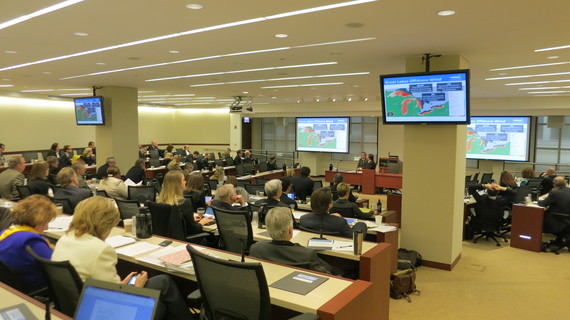Imagine a bustling urban port: ships unload cargo from all over the world; local products are packed and loaded for export; and ferries shuttle eager sightseers from shore to shore.
This sounds like a scene from Europe or the Mediterranean, where a network of shipping vessels and ferries connect cities across oceans and seas. But could this scene represent the future of Chicago and our neighbors on the Great Lakes?
Recently, Illinois Governor Pat Quinn gathered a diverse group of business leaders, non-profit organizations, scientists, politicians, policy-makers, and members of the shipping and import industries to discuss the future of Great Lakes ports. The two-day session was titled "Great Lakes Ports and Regional Growth: Integrating Environmental Health and Economic Prosperity" and was held in Chicago. Guest speakers described the benefits that economic development of ports has brought to communities in Europe and Africa.
I've seen firsthand the world-class shipping and ferry infrastructure in Sydney, Australia, Durban, South Africa, and closer to home in New York/New Jersey and San Francisco and how it's benefited their respective regions.
The question is, should development of port infrastructure be an appropriate next step for Great Lakes cities, including Chicago?
The Great Lakes region is already an enormous hub of economic activity. According to the U.S. Bureau of Labor Statistics, more than 1.5 million U.S. jobs are linked directly to the Great Lakes, amounting to more than $62 billion annually in wages. In total, annual economic activity in the Great Lakes region is estimated at 4.4 trillion, which ranks as the fourth largest GDP in the world.
Presenter Olaf Merk of the Organisation for Economic Cooperation and Development (OCED) argued that while the Great Lakes are already an important part of Chicago's economy, responsible development of port infrastructure and networks could create even more jobs and economic benefits. Merk shared the results of a recent study by his organization which found that Chicago faces an economic tipping point at the edge of becoming a world-class, "Premier League" city. The study identified development of our city's infrastructure -- including ports -- as key actions to tap into new markets and create economic growth.
Our geographic position in the Midwest has long made Chicago a commercial transportation hub. Our rail lines are a major crossing for the entire nation, and our ports are the busiest of any city on the Great Lakes. Still, speaker Magnus Sjöberg from the Ports of Stockholm, explained that Great Lakes ports represent untapped opportunity for Chicago and the entire Great Lakes region. Cities connected by commercial shipping trade and passenger ferries move faster and have access to more economic benefits. Trade in and out of cites by rail is limited by rail lines which are already congested.
As demand for access to Chicago's busy rail lines increases, use of our ports for commercial transportation could fill infrastructure gaps and improve connectivity to our neighboring economies. Development of passenger ferries and other recreation infrastructure could also complement our city's thriving tourism industry and add yet another attraction to our shoreline.
Of course, the Great Lakes are not valuable just for their economic potential, but provide us with life-sustaining ecological services as well. The Great Lakes are home to more than 3,500 species of plants and animals, and contain more than 6 quadrillion gallons of freshwater. At Shedd Aquarium, we are committed to conservation of the Great Lakes through research, education, and supporting restoration of critical habitats. Any activity on the Great Lakes, including development of port infrastructure, would require careful study and mitigation to ensure that its benefits aren't outweighed by ecological costs.
As co-chair of the Council of Great Lakes Governors, Illinois Governor Pat Quinn along with the Illinois Department of Natural Resources, Great Lakes Commission, Federal Reserve Bank of Chicago and National Oceanic and Atmospheric Administration (NOAA) have launched a dialogue about both the possibilities -- and the risks -- that development of ports could offer. This dialogue creates a great opportunity for all of us to imagine an ideal future of our community on the Great Lakes, whatever that may be. So tell me, what does your vision for the Great Lakes region look like?
A diverse group of business leaders, non-profit organizations, scientists, politicians, policy-makers, and members of the shipping and import industries gathered to discuss the future of Great Lakes ports. The two-day session held in Chicago was titled "Great Lakes Ports and Regional Growth: Integrating Environmental Health and Economic Prosperity."
